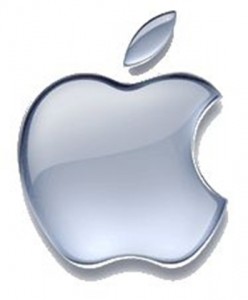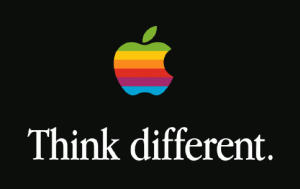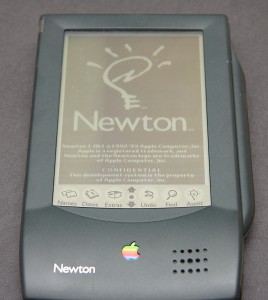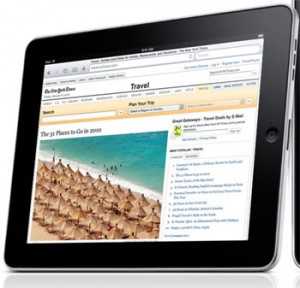 Farshad Manjoo, “10 Lessons from the Coolest Company, Anywhere,” in Fast Company, offers some interesting history and observations on Apple. He writes:
Farshad Manjoo, “10 Lessons from the Coolest Company, Anywhere,” in Fast Company, offers some interesting history and observations on Apple. He writes:
The one-time underdog from Cupertino is the biggest music company in the world and soon may rule the market for e-books as well. What’s next? Farming? Toothbrushes? Fixing the airline industry?
As much as I respect Steve Jobs, I don’t see him changing farming or fixing the government, as is suggested in the Fast Company article. The cool iPhone / iPad apps that identify trees and constellations can not tap a maple tree, milk a cow, slaughter and butcher a cow, hog, or chicken. The iPhone can’t even scramble eggs or make a cup of coffee.
Apple makes mistakes, as the “Death Grip” on the iPhone 4 proves. And they are on and overloading the AT&T network; maybe they should switch to another carrier. Be that as it may, as Manjoo says:
Right now, it seems as if Apple could do all that and more. The company’s surge over the past few years has resembled a space-shuttle launch — a series of rapid, tightly choreographed explosions that leave everyone dumbfounded and smiling. The whole thing has happened so quickly, and seemed so natural, that there has been little opportunity to understand what we have been witnessing.
The company, its leader, and its products have become cultural lingua franca. Dell wants to be the Apple for business; Zipcar the Apple for car sharing. Industries such as health care and clean energy search for their own Steve Jobs, while comedian Bill Maher says the government would be better run if the Apple CEO were head of state. (The Justice Department and FTC, which are both investigating Apple’s tactics, might disagree.)
Manjoo mentions the Newton, the first commercial notepad computer, a revolutionary product – like every Apple product – but doesn’t mention that the Newton and the Lisa – the first commercial computer with a GUI – while great – were commercial failures, or that the iPad appears to be the successor to the Newton (click here).
In discussing what might be termed “The Apple Way,” Manjoo looks for magic bullets. There are none. Like Toyota, Boeing, and the other top companies, Apple is successful because of discipline and hard work. And simplicity, marketing, and customer service.
Manjoo writes that Apple is killing the mouse, as if this is dramatic or horrific. He doesn’t realize that the mouse is simply a peripheral that serves to move a marker, called a “sprite” in the X-Windows labs, around the screen. Is Apple “gunning” for the mouse? I don’t think so. If it makes life easier, keep it. If it doesn’t, then it has outlived its usefulness. I use a mouse on desktops, a touchpad on laptops. Moving my hand from keyboard to mouse is inefficient. A touchpad would be more efficient. The mouse is useful, but limited. (Click here for “Has the Mouse Outlived its Usefulness?”)
Jobs quotes Henry Ford saying “If I asked people what they want they would say ‘A faster horse.’” Apple doesn’t use “Focus Groups” because they create faster horses. Consider the Macbook power cord. It’s held in place by magnets. If you gently tug on the power cord it falls off. Hold it in proximity to the interface it leaps across space and fits automagically. If you gently tug a non-Mac laptop the power cord rips out or pulls the laptop off a desk. Often the motherboard – power cord interface breaks – requiring a new motherboard, and $200 or $300. The the magnetic power interface, while a great idea, is not an idea from a focus group. If it was, then it would be on other laptops.
Regarding Open Architectures, Apple’s OS X is a BSD variant of the Unix Operating System invented at AT&T Bell Labs in the 70’s. Unlike Linux, which emulates Unix, OS X is Unix. But this is really only important to computer hobbyists. Most Mac users don’t care. They like OS X because it works, it’s secure, they don’t need to worry about viruses.
In the Adobe Flash v HTML 5 and H.264 argument Apple is technically correct. Adobe Flash is a proprietary product, as is MS Windows, and OS X. HTML is an open language defined by Internet Request For Comments. But like the the Unix v Linux v Windows battles, it is only the computer geeks who really care.
 What might be called “The Apple Way” is
What might be called “The Apple Way” is
- Discipline,
- Hard Work,
- Design for Simplicity,
- Good Customer Service,
- Making Our Own Rules,
- Products that Feel like Magic,
- Things People Love.
Think Different.
Jobs and company create a series of what James Collins an Jerry Porras in “Built To Last” (ISBN: 978-0060566104) called “Big Hairy Audacious Goals.” When the team achieves one, they move on to the next. Apple doesn’t “break the rules” as much as it makes their own rules, which is summed up in the “Think Different” mantra / zeitgeist. The big question for me is “What happens after Steve Jobs? Will Apple fade like Westinghouse after Westinghouse or GM after Sloan or will it prosper like Disney after Disney, IBM after Tom Watson, Sr., and Tom Watson, Jr., and HP after Hewlett and Packard? I’m betting on prosper.


